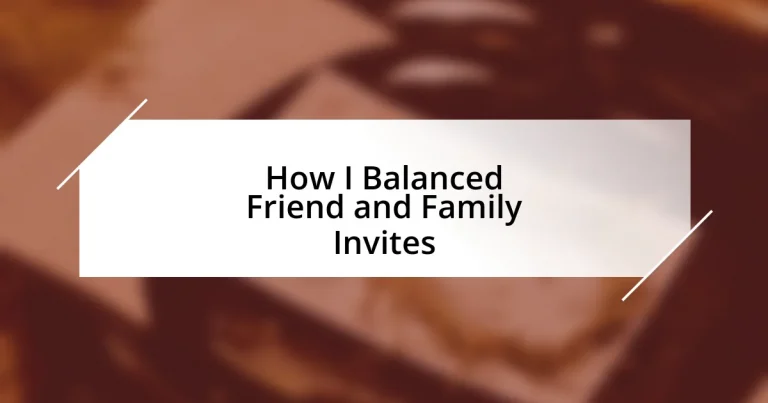Key takeaways:
- Balancing relationships involves prioritizing family and friends, reflecting personal values and emotional needs.
- Clear communication and setting expectations with loved ones enhance understanding and strengthen connections.
- Cultivating personal time and setting healthy boundaries are essential for maintaining well-being and nurturing relationships.
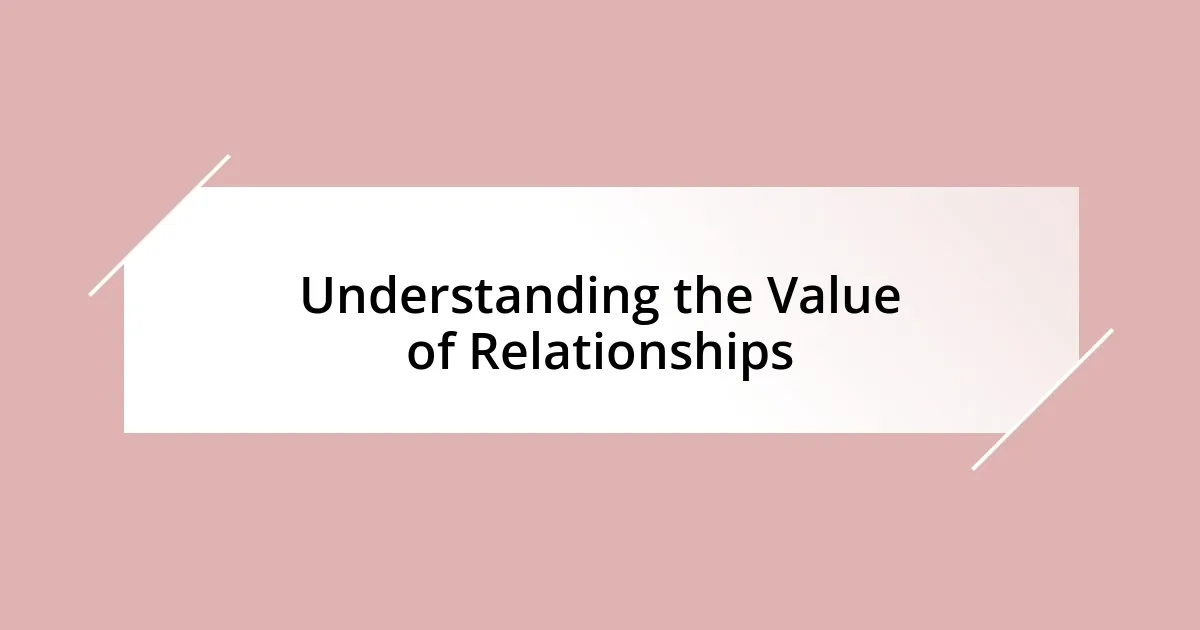
Understanding the Value of Relationships
Relationships are like the threads that weave the fabric of our lives. I remember a time when I prioritized a friend’s invitation over family plans, and while it was a fun evening, I couldn’t shake the feeling that I’d disappointed my family. Isn’t it interesting how the choices we make with our time can reflect our values and priorities?
I’ve often found that the richness of my life comes from balancing these connections. Think about it—whether it’s sharing a laugh with friends or having heartfelt conversations with family, each interaction adds a unique layer to my experience. When was the last time you felt that spark of joy from a simple connection? For me, it often happens during those unexpected moments, like a phone call from a friend when I’m having a rough day.
Cherishing relationships also means understanding their ebb and flow. I’ve seen friendships evolve and families grow, and each phase brings its own lessons. Have you ever realized how a friend can become closer when life gets challenging? It’s those tough times that often strengthen our bonds, teaching us to appreciate each moment.
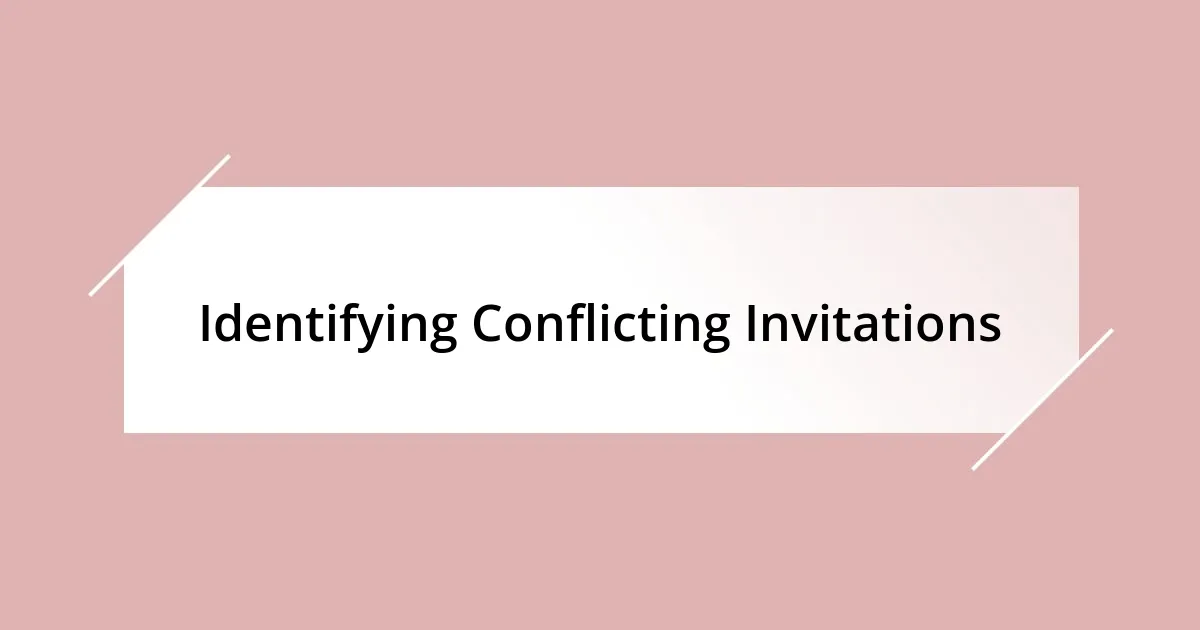
Identifying Conflicting Invitations
Identifying conflicting invitations can often feel like navigating a maze. I recall a time when I received an invitation to a close friend’s birthday party, just as my family was planning a reunion. My gut instinct kicked in—both events were meaningful, but I could only choose one. It was a moment that made me acutely aware of how intertwined our social circles can be and how one decision might ripple through relationships.
To make this easier, I’ve developed a way to assess potential conflicts, which helps me decide where to focus my energies. Here’s what I consider:
- Date and Time: Are the events overlapping, or is there a buffer?
- Significance: How important is each occasion to me and others involved?
- Expectations: What do the hosts hope of my presence, and what have I committed to?
- Past Patterns: Have I frequently missed family gatherings in favor of friends, or vice versa?
- Personal Well-being: Which choice aligns best with how I’m feeling emotionally at the moment?
Taking the time to weigh these factors alleviated the tension I felt when I had to decline one of the invitations. It’s a balancing act, but acknowledging conflicting invitations allows me to prioritize what truly matters.
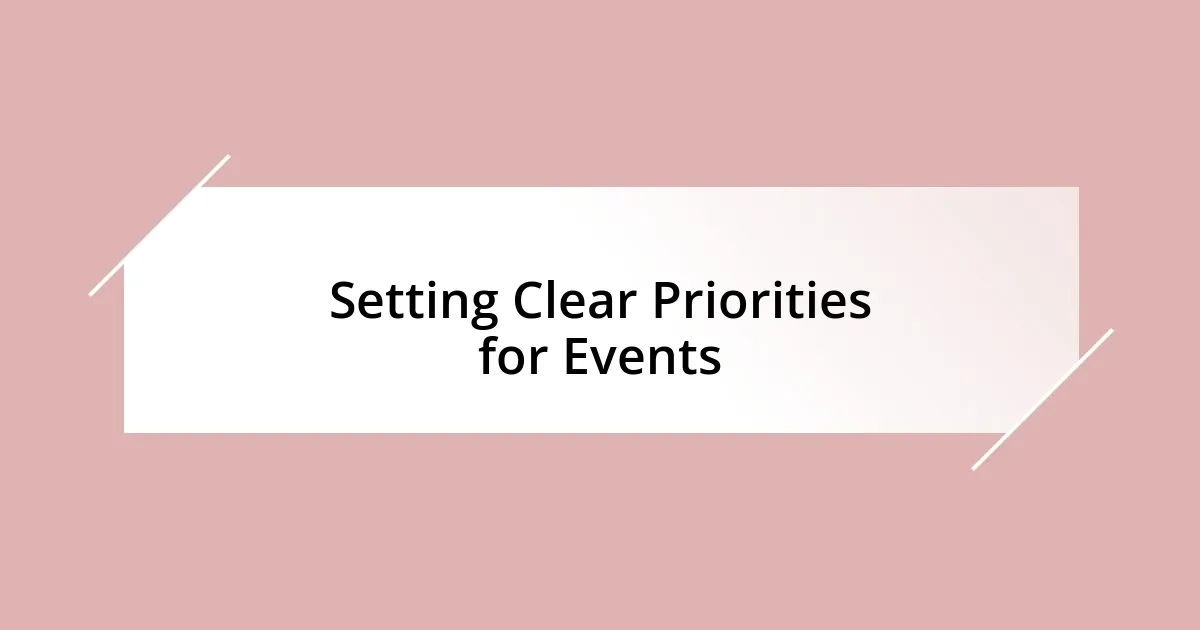
Setting Clear Priorities for Events
Setting clear priorities for events is essential for maintaining balance in life. I’ve learned that writing down both family and friend invites makes the process easier. By seeing everything laid out, I can evaluate which events resonate more with my current mood or commitments. There was a time when I felt overwhelmed by invites and decided to keep a digital calendar. This simple decision transformed how I managed my social life, making everything feel less chaotic and more manageable.
It’s inspiring to reflect on the significance of each event. For instance, I once chose a family gathering over a friend’s party because it was a milestone for my relative. The joy and gratitude expressed by my family warmed my heart, reminding me of the importance of prioritizing fundamental occasions. Have you noticed how certain events can hold more weight than others? It’s these moments that often define our relationships and shape our journey.
To help clarify your priorities and make sound decisions, consider the importance of these factors:
| Factor | Description |
|---|---|
| Significance | Determine how much this event means to you and others. |
| Commitments | Reflect on previous obligations and unfulfilled promises. |
| Personal Connection | Consider the depth of your relationship with the invitees. |
| Emotional Needs | Assess what you need in terms of support or enjoyment. |
| Recovery Time | Think about how much socializing you can realistically handle. |
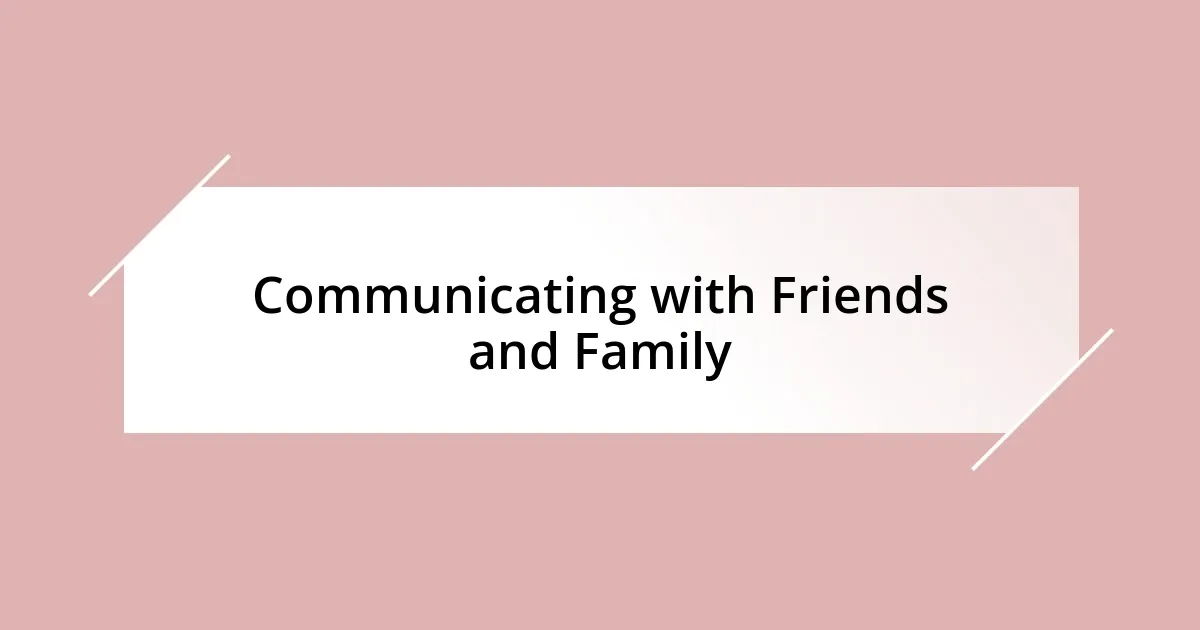
Communicating with Friends and Family
Communicating effectively with friends and family is an important part of navigating competing invites. I remember when I had to reach out to my friend to explain my situation about missing his barbecue due to a family event. The response was overwhelmingly understanding, which reinforced to me the value of open dialogue. Have you ever felt anxious about disappointing someone? I think those conversations often deepen connections, showing that honesty is sometimes just as important as presence.
When it comes to balancing invites, I’ve found that setting expectations in advance can save a lot of heartache later. For instance, I recently told my family that I need time to recharge after social outings. It was vital for them to understand that sometimes I can’t join every gathering. This honesty prompted a discussion about everyone’s needs and feelings, which made me feel more aligned with them. Have you ever tried sharing your limits with loved ones? It can transform how everyone approaches invitations.
Additionally, I prioritize checking in on those who might feel left out or sidelined by my decisions. One time, after declining a friend’s wedding invitation, I sent a heartfelt message letting her know how much her friendship means to me. It bridged the gap that could have formed from my absence. How do you ensure that your loved ones know they still matter, even when you can’t be there? I believe these little gestures remind everyone that, while physical presence is important, emotional connections are what really hold relationships together.
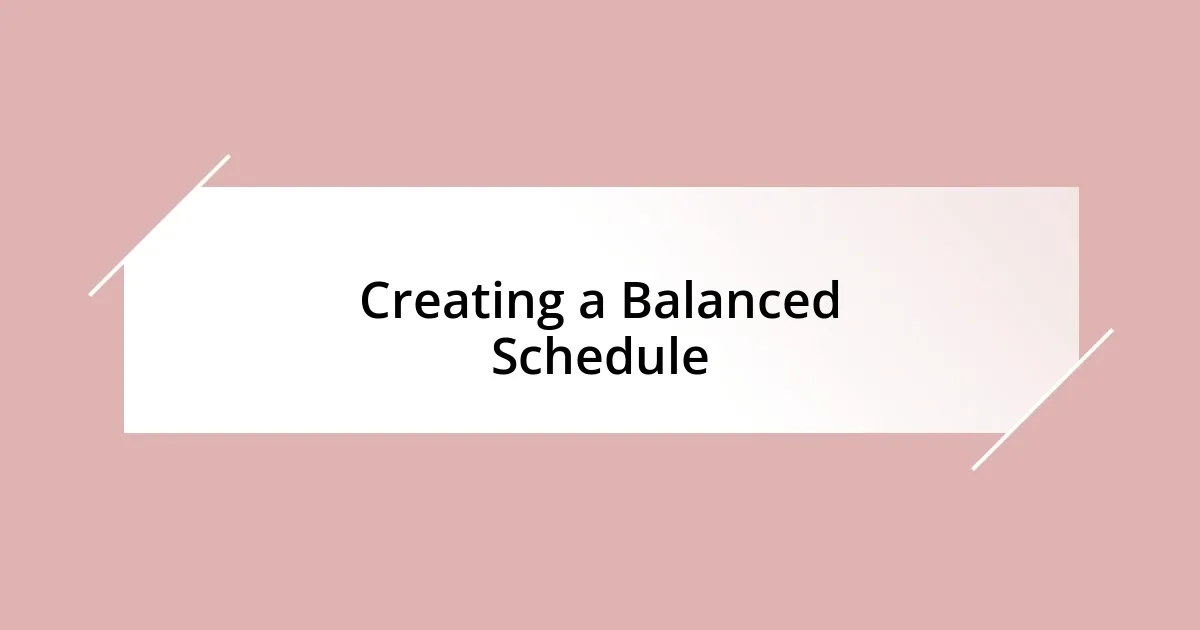
Creating a Balanced Schedule
Creating a balanced schedule starts with clear visualizations. I’ve personally found that color-coding my calendar—using different colors for family events, friend gatherings, and even downtime—has made a world of difference. It’s almost like painting a picture of my life; suddenly, I can see the big picture and not just the details. Have you ever tried something similar? This technique not only helps me balance my commitments but also highlights days when I might need a breather.
There are instances when unexpected events pop up, and that’s when flexibility becomes key. Once, I had to shuffle my plans around because a close friend was in town. It required adjusting my careful schedule, but the joy of reconnecting was worth the change. How often do we miss out on these spontaneous moments because we’re too rigid with our plans? I think it’s crucial to remember that life is about connections, and sometimes, those last-minute invites lead to the most memorable experiences.
Another strategy I’ve adopted is scheduling recurring family and friend get-togethers, creating a rhythm in my social life. For example, I set aside the first Sunday of every month for a family brunch. This not only assures that I spend quality time with my family but also makes it easier to politely decline other events that pop up around those dates. Have you ever established such routines? I’ve noticed that when everyone knows these designated times, it takes the pressure off trying to fit everyone in all at once, allowing for a more meaningful connection when we do gather.
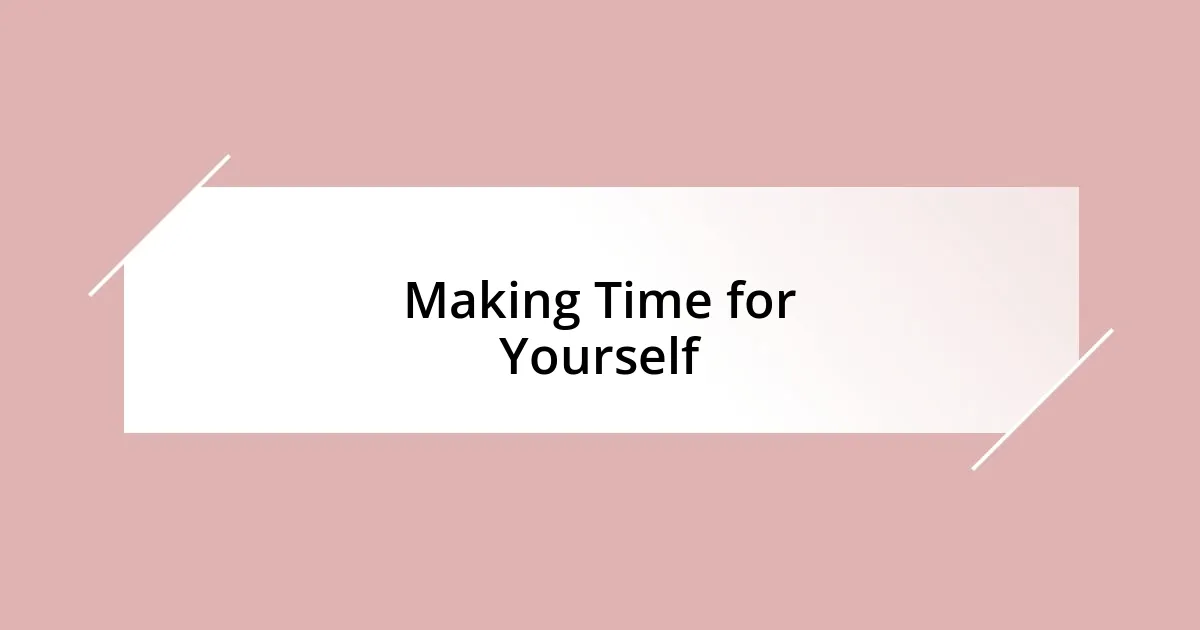
Making Time for Yourself
It’s easy to get swept away in the hustle of life, but I’ve found that carving out personal time is essential for my well-being. One weekend, feeling overwhelmed, I made a conscious decision to spend the Saturday solo. I indulged in my favorite book and brewed a steaming cup of herbal tea. The sense of calm that washed over me made me realize how crucial those moments are. Have you ever taken a day just for yourself? I believe it’s not just about rest—it’s about reconnecting with who you are.
I often remind myself that saying no to an invitation doesn’t mean I value my friends and family less. I remember a Friday when I turned down dinner plans to focus on writing. That evening, sitting at my desk as the sun set, I felt a deep sense of satisfaction. It’s a reminder that my passion for creativity needs nurturing too. How does it feel when you put your needs first? Embracing that guilt-free choice can be liberating and fulfilling.
Setting boundaries has also been transformative for me. I once had a friend who would regularly invite me to engage in late-night outings, which left me drained the following day. By gently explaining that I need to prioritize my rest, I not only found my energy levels improving, but our friendship grew stronger too. Have you ever noticed a change in your relationships when you set healthy boundaries? I think it’s empowering to recognize that we can still be dedicated friends while nurturing our personal needs.
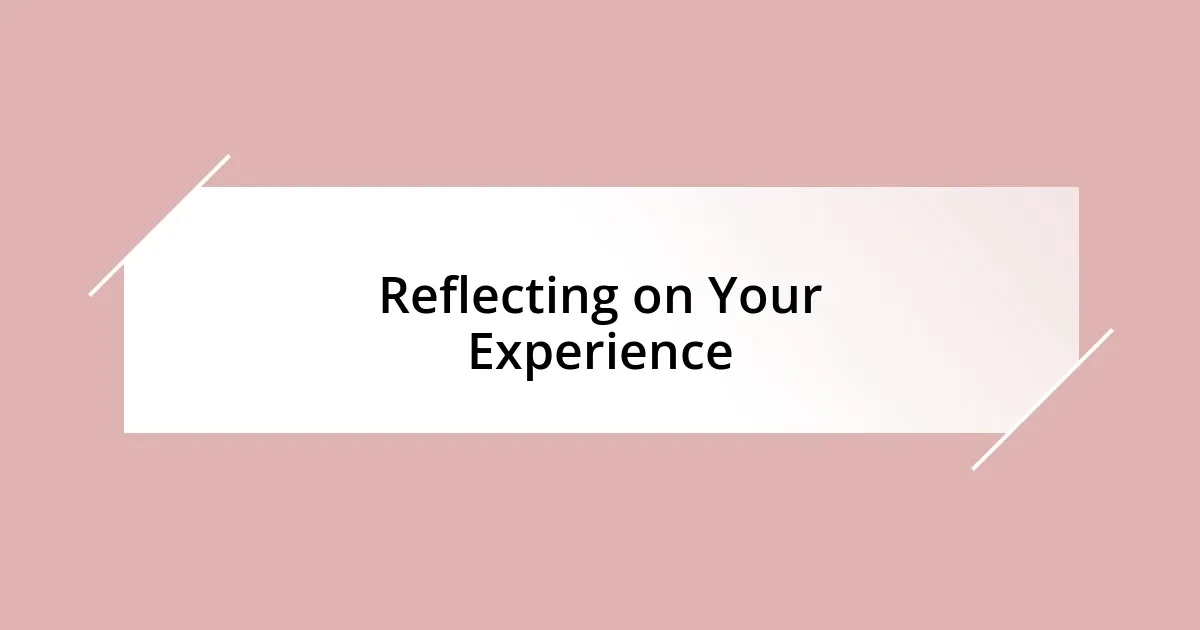
Reflecting on Your Experience
Reflecting on my experience, I’ve often found that the balance between family and friend invites deeply shapes my relationships. There was a particularly hectic month when I juggled back-to-back invites from both sides. Instead of feeling overwhelmed, I approached it as an opportunity to reflect on what truly mattered. It was enlightening to realize how different dynamics emerge when I prioritize certain gatherings over others. Have you ever felt that pull between your closest circles?
One time, while attending a family gathering, I noticed the warmth of laughter and shared stories enveloping me. It reminded me of the roots of my relationships—how they nourish me in different ways. Yet, I also recognized an email from a friend inviting me to a long-awaited reunion. The joy of my family gathering was irreplaceable, but the thought of missing out on reconnecting with my friends sparked a sense of urgency. In moments like these, I realized it’s okay to feel torn; it’s simply a part of cherishing both family and friendships.
I still think about the lessons learned from those experiences. I learned that balancing friend and family invites isn’t just about logistics; it’s a reflection of my evolving priorities. Each decision to attend or decline is a step towards understanding not only what I need but also what my loved ones value. Have you explored how your choices in these moments reveal deeper truths about your connections? I think that navigating these choices helps me grow both as an individual and in my relationships.












